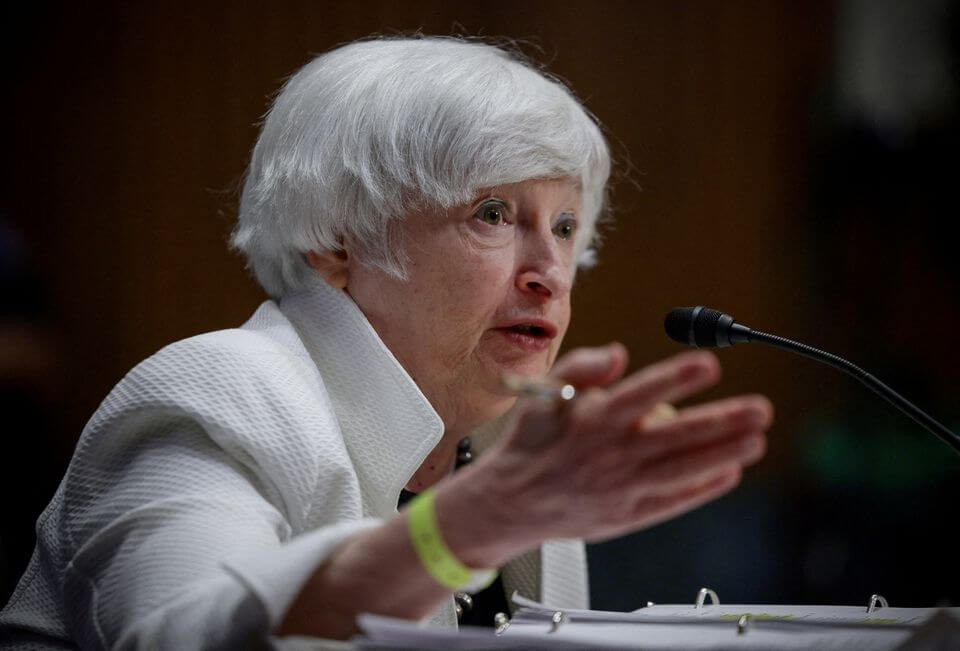In a virtual meeting with Chinese Vice Premier Liu He on Tuesday, United States (US) Secretary of Treasury Janet Yellen called out China’s “unfair” non-market economic practices while also raising concern about the impact of Russia’s invasion of Ukraine on the global economy.
Despite calling for dialogue, China has not condemned Russia for the Ukraine war and has instead slammed Western countries for supplying arms to Ukraine and prolonging the conflict.
As per a readout from the Treasury Department, the pair also discussed “the global economic outlook amid rising commodity prices and food security challenges.”
According to a ministry statement, both Liu and Yellen agreed that there is a need to improve communication and macroeconomic policy coordination between China and the US.
— BNN Newsroom (@BNNBreaking) July 5, 2022
Liu, for his part, expressed his apprehensions regarding the “lifting of additional tariffs on China and sanctions by the US side, and fair treatment of Chinese enterprises.” According to state-owned Chinese news agency Xinhua, the pair had a “constructive” conversation on the macroeconomic situation and vowed to “strengthen” their coordination in an effort to jointly maintain the stability of the global industrial and supply chains.
The meeting comes against the backdrop of US President Joe Biden mulling over removing some tariffs on Chinese products like clothing and school supplies in a bid to contain rising commodity prices, with inflation at a 40-year high of 8.6%. “Reconfiguring some of those tariffs so they make more sense and reducing unnecessary burdens is something that’s under consideration,” Yellen told ABC News last month.
According to officials familiar with the discussion, a decision is expected at the earliest, since the additional duties, imposed by the Trump administration, are slated to expire on July 6. In this respect, White House spokesperson Karine Jean-Pierre asserted that the Biden administration is working to ensure that the “tariffs are aligned with our economic and strategic priorities, such as safeguarding the interests of workers and critical industries, advancing our national security, and not unnecessarily raising costs on Americans.”
Between 2018 and 2019, the Trump administration imposed tariffs on Chinese imports worth up to $370 billion. Trump decided to keep these additional duties in place in a 2020 trade agreement with Beijing in order to punish China for its unfair market practices and ensure compliance with the provisions of the deal, including increased purchases of American goods. However, the Chinese government did not adhere to the agreement by not expanding its American imports.
In fact, China does not appear to have changed its behaviour, despite the sanctions. Therefore, US Trade Representative Katherine Tai is against revoking any tariffs, opining that it is “a significant piece of leverage, and a trade negotiator never walks away from leverage.”
The US manufacturing employment share hasn't been significantly impacted by the trade war with China pic.twitter.com/TDkEbmI5tz
— Tom Hancock (@hancocktom) July 5, 2022
Progressive Democrats and labour unions, too, are not in favour of removing any of the sanctions against China, arguing that the Asian giant has “only doubled down on their strategy and approach.” “We think it’s the wrong time to relax tariffs on China,” American Federation of Labor and Congress of Industrial Organizations (AFL-CIO) President Liz Shuler told CNN in June following a meeting with Biden. “We think it would have a marginal impact, at best, on inflation,” she added.
In fact, the proposed tariff cuts would make only a 0.26% difference to the Consumer Price Index (CPI), as per a study. However, Chinese experts believe the CPI would fall by 1.5% if all additional tariffs are revoked, which could prove crucial for the Biden government ahead of mid-term elections in November.
Last month, Biden mentioned that he would speak with Chinese President Xi Jinping “soon.” Some advisors had also suggested asking Xi for reciprocal tariff cuts imposed on American products, but the proposal was promptly squashed.
China has repeatedly vouched for the removal of extra duties, with the Chinese Ambassador to the US, Qin Gang, claiming that it hasn’t resulted in reducing Washington’s trade deficit but has instead increased costs for American companies by over $1.7 trillion and American households by an average of $1,300 per year.
In this regard, senior research fellow at the Chongyang Institute for Financial Studies at Renmin University He Weiwen told Chinese state-owned news outlet Global Times that the reduction in duties would not impact Chinese companies, as the costs of the tariffs are borne by American consumers. “For Chinese companies, it is necessary to continue to stabilise the US market and at the same time strive to expand into other markets,” he said, stating that the US cancelling all additional duties is unlikely.

